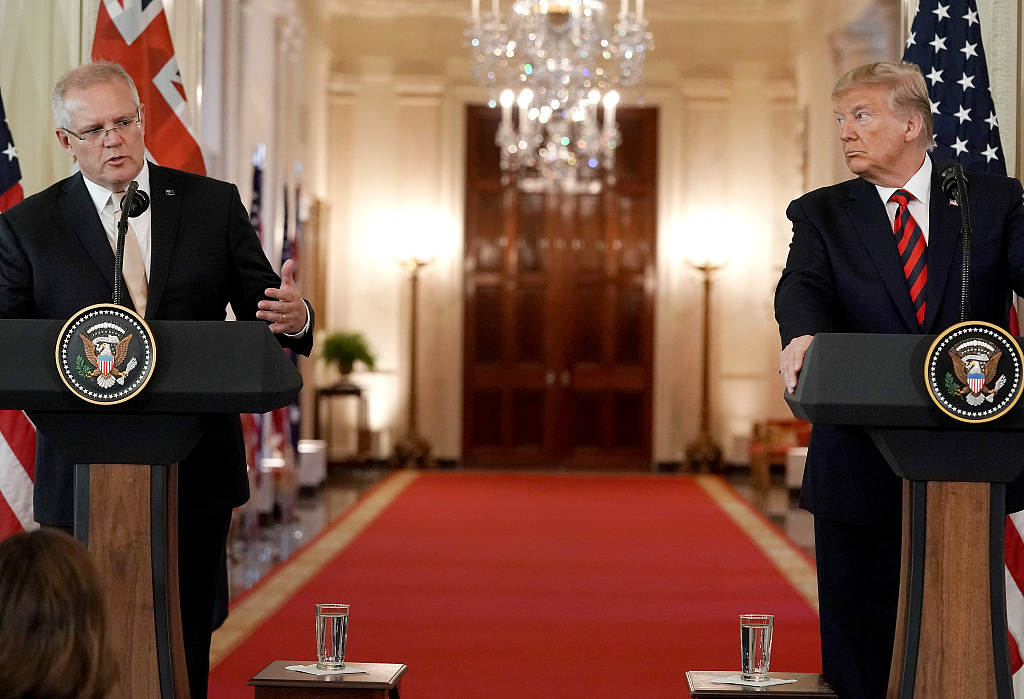Editor's note: Li Zheng is an associate research fellow at the China Institutes of Contemporary International Relations, Institute of American Studies, and the director of the American Security Center, Institute of American Studies. The article reflects the author's opinions, and not necessarily the views of CGTN.
Australian Prime Minister Scott Morrison started a high-profile visit to the United States on September 20. Morrison received a warm reception from President Donald Trump. The first lady of the United States, Melania Trump, carefully arranged the state banquet according to the color of the Australian flag to celebrate the Australian Prime Minister's official visit to the United States after 14 years.
China has become an important topic for Trump and Morrison. Australia hopes that the United States will continue to increase its security commitment to the Indo-Pacific region and confront the rise of Asian powers. Trump hopes to strengthen cooperation on energy and rare earth and expand mutual economic interests. Both issues allude to China.
In recent years, the relationship between the United States and Australia has become increasingly close, and it has become a major factor in changing the geographical balance of the Indo-Pacific region. On the 5G issue, Australia first proposed to exclude Chinese companies from the list of suppliers and support the American's tough attitude on Huawei. Australia took the initiative to send a warship to cruise in the South China Sea. Australia also widely publicizes China's influence on the South Pacific island countries and requires other countries outside the region to hedge against China.
These practices are not in line with Australia's role in China and the United States for many years. Traditionally, Australia has relied on China economically and is only closer to the United States in terms of security. Australia does not want the confrontation between China and the United States to heat up, because it hurts both Australia's economic prospects and its own security.
This transformation comes from two reasons. Firstly, Australia believes that the contrast between China and the United States has undergone a decisive change. On August, Australia's well-known think tank Lowy Institute issued a report saying that China's military strength in the Indo-Pacific region has grown rapidly and the United States has been unable to maintain its military superiority in the region.

U.S President Donald Trump and Australian Prime Minister Scott Morrison at a joint press conference in the East Room of the White House in Washington, DC, U.S., September 20, 2019. /VCG Photo
U.S President Donald Trump and Australian Prime Minister Scott Morrison at a joint press conference in the East Room of the White House in Washington, DC, U.S., September 20, 2019. /VCG Photo
The report of the Lowy institute is not a hasty judgment. Since the Trump administration, although the U.S. military pressure on China has increased, the scope of activities of the Chinese military has continued to expand. The Chinese navy and air force began to carry out a wider range of patrols and drills, and their scope crossed the first island chain. This change has made Australia and other Western middle countries nervous. If the United States can no longer protect its security, their favorable positions between China and the United States cannot be maintained.
Secondly, the United States hopes that countries such as Australia stand on the front line against China and leave some flexibility for Sino-U.S. relations. Australia's attitude toward China has been guided by the United States. In the case of Huawei, the key player in Australian government decision-making is a report from U.S. intelligence agencies. The cooperation between the two sides in the security field is not open, but from the facts, Australia has never made a unilateral action that surprised the United States, showing that the U.S. is the leader behind it.
The United States directed Australia to take the lead in challenging China for a dual purpose. On the one hand, such actions can give China greater pressure to let China feel the unanimous attitude of Western countries toward China. On the other hand, Australia's actions have reduced the urgency of Sino-U.S. confrontation in the security field. Once the United States finds a way to respond to China's rise with non-confrontational means, Australia can quickly change its attitude to repair its relationship with China.
This strategy not only achieves the purpose of containing China's rise, but also leaves other options. However, once these U.S. allies find that their economic relationship with China is not irreplaceable, they may reconsider the cost of this strategy.
(If you want to contribute and have specific expertise, please contact us at opinions@cgtn.com.)